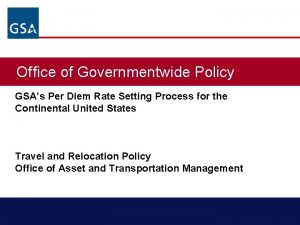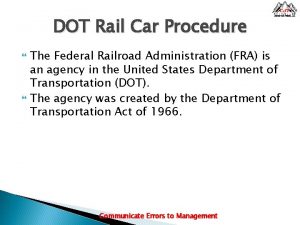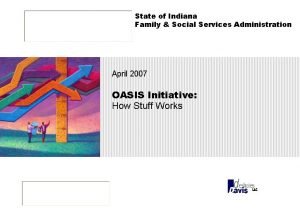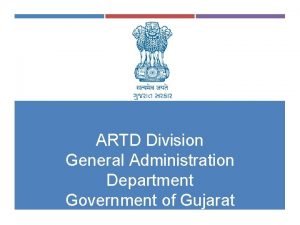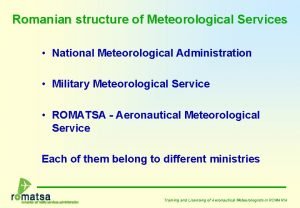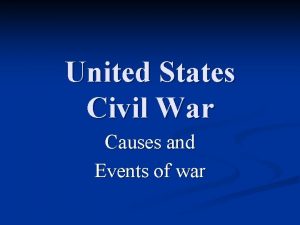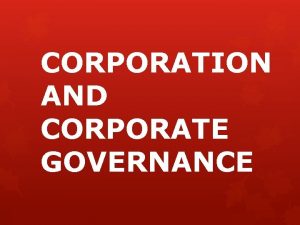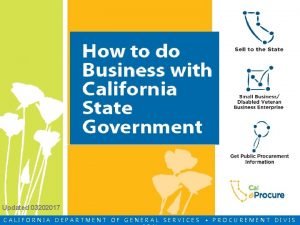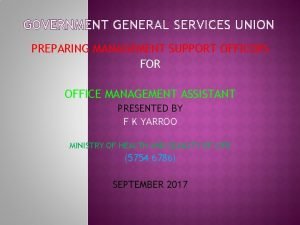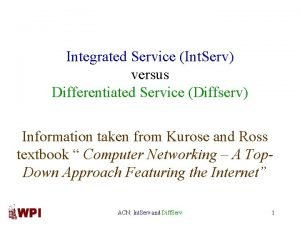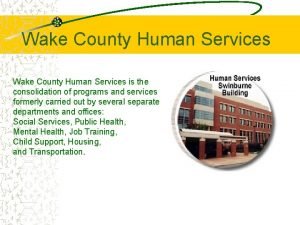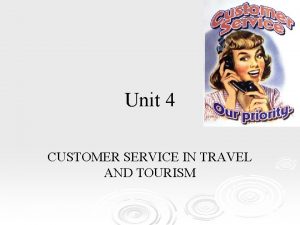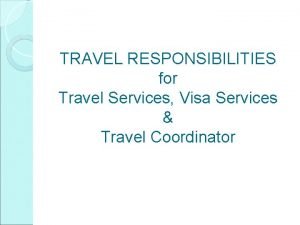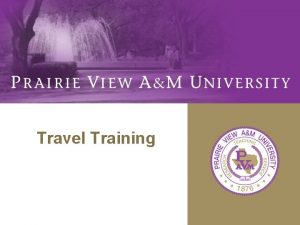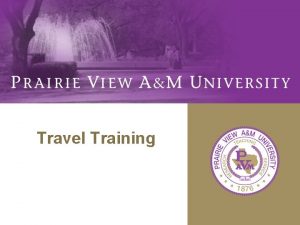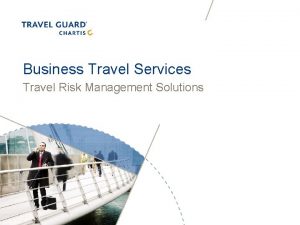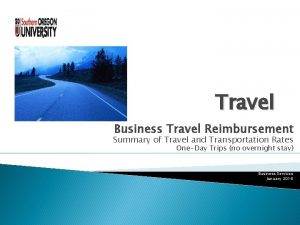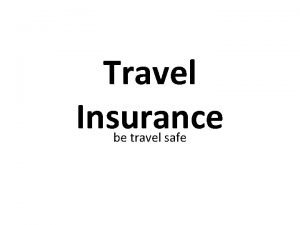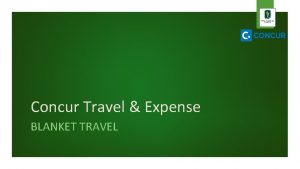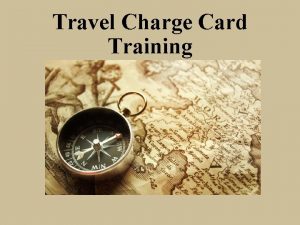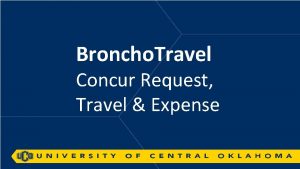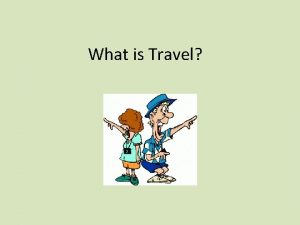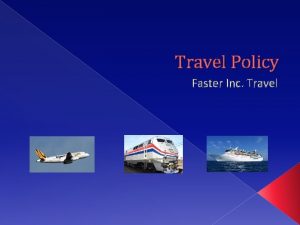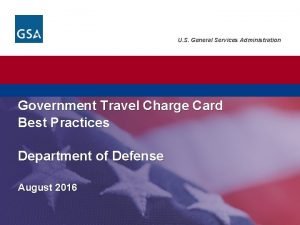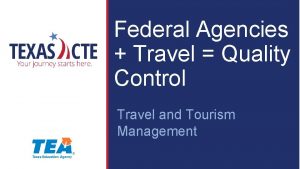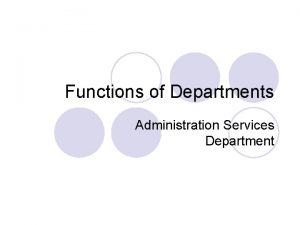U S General Services Administration Federal Travel and

















- Slides: 17

U. S. General Services Administration Federal Travel and Ethics GSA Smart. Pay® Training Forum August 1 -3, 2017 presented by Jeremiah Strack Senior Assistant General Counsel GSA Office of General Counsel

Today’s Itinerary • Paying for Travel • Smart. Pay® Travel Card • Non-Federal Source Travel • Transportation • Classes of Air • Privately-Owned Aircraft • Rental Cars and TNCs • City-Pair Program • Promotional Benefits and Denied Boarding Compensation • Conferences • Preferred Lodging Programs (inc. Fed. Rooms®) For all slides: check the speaker’s notes for more info 2

Paying for Travel: Smart. Pay® Travel Card • What GSA says: • Must use for all expenses directly related to official travel, unless impractical, imposes unreasonable costs, or employee is exempt • Exemptions for employees with pending applications, when card would adversely affect mission or safety, or employee not eligible • What your agency (may) say: • Set specifics of use and penalties for misuse • Agency can also make its own exemptions • Why is use mandatory • It’s the law • It helps the Government 3

Paying for Travel: Non-Federal Source • Authorized by 31 U. S. C. sec. 1353 and implemented in FTR Chapter 304 • The basic process • Non-Federal source (NFS) offers • Offer evaluated by high level agency official • *Agency* accepts the offer • After the fact authorization (FTR 304 -3. 13) is only for limited circumstances, when neither the agency or employee knew about the offer before travel began • Amendment about registration fee waiver for speakers 4

Coach Class Air • Coach class is the default • Coach-class seating upgrade allowed subject to agency policy • First class and business class airline accommodations can only be used in specific, limited circumstances. In most of these circumstances, agencies still have discretion to not authorize otherthan-coach class travel 5

First Class Air Exceptions • No coach class reasonably available within 24 hours • Accommodate a disability or special needs • Medical certifications required • Also covers attendants • Exceptional security requirements • Required for agency mission • Upgrade at personal expense 6

Business Class Air Exceptions • Accommodate a disability or special need • Exceptional security requirements • Inadequate sanitation or health standards in coach class on a foreign carrier • Regularly scheduled flights provide only other-than-coach class accommodations • Non-Federal source pays costs • 14 -hour Rule • Overall cost savings • No coach class seats available in time to accomplish the mission • Required for agency mission • Upgrade at personal expense 7

Privately-Owned Aircraft • What happens when agency employee’s decide to “plane-pool” on one of their private jets? • If common carrier is authorized, employee can use a privatelyowned vehicle (including an aircraft), but their reimbursement limited to the constructive cost of the authorized method of transportation. • If more than one employee travels by the same POV, only one of them is reimbursed. 8

Rental Cars • “Should consider” renting off of DTMO Car Rental Agreement • Default is least expensive compact car, with exceptions for: • Special need or disability • Agency mission • Cost of other classes is less • Room for employees and/or Government material • Safety reasons (such as severe weather and rough terrain) • No reimbursement for pre-paid refueling • No reimbursement for insurance in CONUS • OCONUS: if required by law, or agency policy permits 9

TNC • Transportation network companies (TNCs) are reimbursable as a kind of special conveyance • More concrete regulations may be required, depending on legislation 10

City-Pair Program • Required for official travel • Exceptions: • Space is not available to accomplish the mission, or would incur additional per diem, increasing the total cost of the trip • Contract schedule not consistent with agency policy on travel during duty hours • A non-contract carrier offers a cheaper fare available to the general public (still booked through agency TMC) • Rail used instead • Smoking flight • Cannot be used for personal travel 11

Promotional Benefits • Promotional benefits earned on official travel may be retained for personal use. Does not apply to promotional benefits for planning and/or scheduling an official conference. • Applies to promotional benefits offered to the general public, and with no additional cost to the Government. • A promotional benefit includes anything that the travel service provider gives without it being mandated by the contract. This includes frequent flyer miles, seat upgrades, access to lounges, gift cards, and item/service vouchers. 12

Denied Boarding Compensation • On overbooked flights, the airline is required to first request volunteers and offer compensation of the airline’s choosing. Only after requesting volunteers may the airline deny boarding (involuntarily bumping) and compensate with cash. • Employee voluntarily vacates an overbooked flight: employee can keep the compensation. Employee bears costs of extra travel expenses, and may have to take leave for delay. • Employee is involuntarily bumped from a flight: compensation must be in the form of a check payable to the Treasurer of the United States. 13

Conferences • When lodging expenses are above per diem levels, the agency may authorize actual expense reimbursement • Agency may provide meals and/or light refreshments when: • (1) meals/refreshments are incidental to the conference, • (2) attendance at meals/refreshments is important for employees' full participation in the conference, and • (3) meals/refreshments are part of a formal conference that includes not just the meals/refreshments, but also includes substantial functions occurring separately from when the food is served. 14

Preferred Lodging Programs • Generally, an agency can’t tell an employee where to stay on official travel, unless it is necessary for the mission or to protect Government property • Exception: Do. D Integrated Lodging Program • For everyone else • FTR says employees “should consider” using Fed. Rooms® • Agency policy can say employee “must consider, ” but still no policy violation if a non-Fed. Rooms® property is chosen • Legal changes may be coming 15

Contact Information • • Jeremiah Strack Email: jeremiah. strack@gsa. gov Phone: (202) 501 -0496 Fax: (202) 501 -0583 Thanks for coming, and have a great day! 16

GSA Starmark Logo 17
 Us general services administration per diem
Us general services administration per diem Fha new deal relief recovery reform
Fha new deal relief recovery reform Rsoo
Rsoo Federal railroad administration train car
Federal railroad administration train car Indiana family and social services administration
Indiana family and social services administration Government of gujarat general administration department
Government of gujarat general administration department When new port shipping uses segmented marketing
When new port shipping uses segmented marketing Romanian air traffic services administration
Romanian air traffic services administration Ati blanket training
Ati blanket training Lgss surveyors
Lgss surveyors Planos en cinematografia
Planos en cinematografia Where did general lee surrender to general grant?
Where did general lee surrender to general grant? Marketability in good governance
Marketability in good governance California department of general services
California department of general services Government general services union
Government general services union Difference between intserv and diffserv
Difference between intserv and diffserv Wake county human services community services center
Wake county human services community services center Stated and unstated needs travel and tourism
Stated and unstated needs travel and tourism
